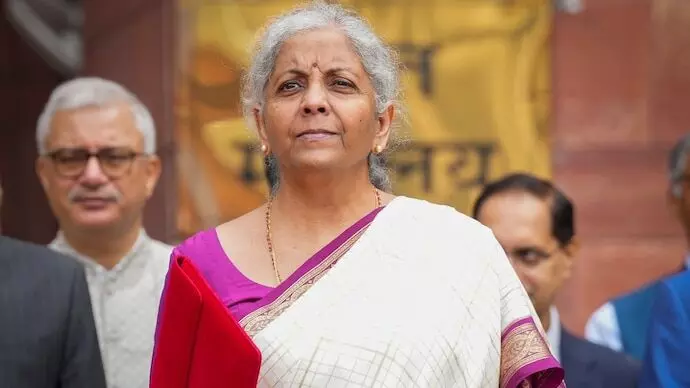India's Economic Resilience Shines in 2024-25 Budget: Focus on Growth, Employment, and Fiscal Prudence

Despite global economy remaining under the grip of policy uncertainties, India’s economic growth continues to be the shining exception and will remain so in the years ahead. Minister of Finance and Corporate Affairs Smt Nirmala Sitharaman, while presenting the Union Budget 2024-25 in Parliament today said that India’s inflation continues to be low, stable and moving towards the 4 per cent target. Core inflation (non-food, non-fuel) currently is 3.1 per cent and steps are being taken to ensure supplies of perishable goods reach market adequately.
Interim Budget
The Finance Minister said that as mentioned in the interim budget, the focus is on 4 major castes, namely ‘Garib’ (Poor), ‘Mahilayen’ (Women), ‘Yuva’ (Youth) and ‘Annadata’ (Farmer).
Budget Theme
Dwelling on the Budget theme, Smt Sitharaman said, turning attention to the full year and beyond, in this budget, we particularly focus on employment, skilling, MSMEs, and the middle class. She announced the Prime Minister’s package of 5 schemes and initiatives to facilitate employment, skilling and other opportunities for 4.1 crore youth over a 5-year period with a central outlay of ₹2 lakh crore. This year, ₹1.48 lakh crore has been allocated for education, employment and skilling.
Budget Priorities
The Finance Minister said, for pursuit of ‘Viksit Bharat’, the budget envisages sustained efforts on the following 9 priorities for generating ample opportunities for all.
- Productivity and resilience in Agriculture
- Employment & Skilling
- Inclusive Human Resource Development and Social Justice
- Manufacturing & Services
- Urban Development
- Energy Security
- Infrastructure
- Innovation, Research & Development and
- Next Generation Reforms
Priority 1: Productivity and resilience in Agriculture
The Finance Minister announced that the government will undertake a comprehensive review of the agriculture research setup to bring the focus on raising productivity. New 109 high-yielding and climate-resilient varieties of 32 field and horticulture crops will be released for cultivation by farmers.
In the next two years, 1 crore farmers across the country will be initiated into natural farming supported by certification and branding.
10,000 need-based bio-input resource centres will be established.
For achieving self-sufficiency in pulses and oilseeds, government will strengthen their production, storage and marketing and to achieve ‘atmanirbharta’ for oil seeds such as mustard, groundnut, sesame, soybean, and sunflower.
Government, in partnership with the states, will facilitate the implementation of the Digital Public Infrastructure (DPI) in agriculture for coverage of farmers and their lands in 3 years.
Smt Sitharaman announced a provision of ₹1.52 lakh crore for agriculture and allied sector this year.
Priority 2: Employment & Skilling
The Finance Minister said that the government will implement 3 schemes for ‘Employment Linked Incentive’, as part of the Prime Minister’s package. These will be based on enrolment in the EPFO, and focus on recognition of first-time employees, and support to employees and employers.
Government will also facilitate higher participation of women in the workforce through setting up of working women hostels in collaboration with industry, and establishing creches.
Referring to the Skilling programme, the Finance Minister announced a new centrally sponsored scheme, as the 4th scheme under the Prime Minister’s package, for skilling in collaboration with state governments and Industry. 20 lakh youth will be skilled over a 5-year period and 1,000 Industrial Training Institutes will be upgraded in hub and spoke arrangements with outcome orientation.
She also announced that the Model Skill Loan Scheme will be revised to facilitate loans up to
₹7.5 lakh with a guarantee from a government promoted Fund, which is expected to help 25,000 students every year.
For helping the youth, who have not been eligible for any benefit under government schemes and policies, she announced a financial support for loans upto ₹10 lakh for higher education in domestic institutions. E-vouchers for this purpose will be given directly to 1 lakh students every year for annual interest subvention of 3 per cent of the loan amount.
Priority 3: Inclusive Human Resource Development and Social Justice
Talking about the Saturation approach, the Finance Minister emphasised that implementation of schemes meant for supporting economic activities by craftsmen, artisans, self-help groups, scheduled caste, schedule tribe and women entrepreneurs, and street vendors, such as PM Vishwakarma, PM SVANidhi, National Livelihood Missions, and Stand-Up India will be stepped up.
Purvodaya
Government will formulate a plan, Purvodaya, for the all-round development of the eastern region of the country covering Bihar, Jharkhand, West Bengal, Odisha and Andhra Pradesh. This will cover human resource development, infrastructure, and generation of economic opportunities to make the region an engine to attain Viksit Bharat.
Pradhan Mantri Janjatiya Unnat Gram Abhiyan
The Finance Minister announced that for improving the socio-economic condition of tribal communities, government will launch the Pradhan Mantri Janjatiya Unnat Gram Abhiyan by adopting saturation coverage for tribal families in tribal-majority villages and aspirational districts covering 63,000 villages and benefitting 5 crore tribal people.
More than 100 branches of India Post Payment Bank will be set up in the North East region to expand the banking services.
She said, a provision of ₹2.66 lakh crore for rural development including rural infrastructure was made this year.
Priority 4: Manufacturing & Services
Support for promotion of MSMEs
Smt Sitharaman said, this budget provides special attention to MSMEs and manufacturing, particularly labour-intensive manufacturing. A separately constituted self-financing guarantee fund will provide, to each applicant, guarantee cover up to ₹100 crore, while the loan amount may be larger. Similarly, Public sector banks will build their in-house capability to assess MSMEs for credit, instead of relying on external assessment. She also announced a new mechanism for facilitating continuation of bank credit to MSMEs during their stress period.
Mudra Loans
The limit of Mudra loans will be enhanced to ₹ 20 lakh from the current ₹ 10 lakh for those entrepreneurs who have availed and successfully repaid previous loans under the ‘Tarun’ category.
MSME Units for Food Irradiation, Quality & Safety Testing
Financial support for setting up of 50 multi-product food irradiation units in the MSME sector will be provided. Setting up of 100 food quality and safety testing labs with NABL accreditation will also be facilitated. To enable MSMEs and traditional artisans to sell their products in international markets, E-Commerce Export Hubs will be set up in public-private-partnership (PPP) mode .
Internship in Top Companies
The Finance Minister said that as the 5th scheme under the Prime Minister’s package, government will launch a comprehensive scheme for providing internship opportunities in 500 top companies to 1 crore youth in 5 years.
Priority 5: Urban Development
Urban Housing
Under the PM AwasYojana Urban 2.0, housing needs of 1 crore urban poor and middle-class families will be addressed with an investment of ₹ 10 lakh crore. This will include the central assistance of ₹ 2.2 lakh crore in the next 5 years.
Water Supply and Sanitation
In partnership with the State Governments and Multilateral Development Banks, government will promote water supply, sewage treatment and solid waste management projects and services for 100 large cities through bankable projects.
PM SVANidhi
She added that building on the success of PM SVANidhi Scheme in transforming the lives of street vendors, Government envisions a scheme to support each year, over the next five years, the development of 100 weekly ‘haats’ or street food hubs in select cities.
Priority 6: Energy Security
The Finance Minister said, in line with the announcement in the interim budget, PM Surya Ghar Muft Bijli Yojana has been launched to install rooftop solar plants to enable 1 crore households obtain free electricity up to 300 units every month. The scheme has generated remarkable response with more than 1.28 crore registrations and 14 lakh applications.
Nuclear energy is expected to form a very significant part of the energy mix for Viksit Bharat.
Priority 7: Infrastructure
The Finance Minister underlined that significant investment the Central Government has made over the years in building and improving infrastructure has had a strong multiplier effect on the economy. Government will endeavour to maintain strong fiscal support for infrastructure over the next 5 years, in conjunction with imperatives of other priorities and fiscal consolidation. ₹11,11,111 crore for capital expenditure has been allocated this year, which is 3.4 per cent of our GDP.
Pradhan Mantri Gram SadakYojana (PMGSY)
The Finance Minister announced that Phase IV of PMGSY will be launched to provide all-weather connectivity to 25,000 rural habitations which have become eligible in view of their population increase.
For Irrigation and Flood Mitigation in Bihar, through the Accelerated Irrigation Benefit Programme and other sources, government will provide financial support for projects with estimated cost of ₹11,500 crore such as the Kosi-Mechi intra-state link and 20 other ongoing and new schemes including barrages, river pollution abatement and irrigation projects. Government will also provide assistance to Assam, Himachal Pradesh, Uttarakhand and Sikkim for flood management, landslides and related projects.
Priority 8: Innovation, Research & Development
The Finance Minister said that government will operationalize the Anusandhan National Research Fund for basic research and prototype development and set up a mechanism for spurring private sector-driven research and innovation at commercial scale with a financing pool of ₹1 lakh crore in line with the announcement in the interim budget.
Space Economy
With our continued emphasis on expanding the space economy by 5 times in the next 10 years, a venture capital fund of ₹1,000 crore will be set up.
Priority 9: Next Generation Reforms
Economic Policy Framework
The Finance Minister said that the government will formulate an Economic Policy Framework to delineate the overarching approach to economic development and set the scope of the next generation of reforms for facilitating employment opportunities and sustaining high growth.
Labour related reforms
Government will facilitate the provision of a wide array of services to labour, including those for employment and skilling. A comprehensive integration of e-shram portal with other portals will facilitate such one-stop solution. Shram Suvidha and Samadhan portals will be revamped to enhance ease of compliance for industry and trade.
Government will develop a taxonomy for climate finance for enhancing the availability of capital for climate adaptation and mitigation.
Foreign Direct Investment and Overseas Investment
The rules and regulations for Foreign Direct Investment and Overseas Investments will be simplified to (1) facilitate foreign direct investments, (2) nudge prioritization, and (3) promote opportunities for using Indian Rupee as a currency for overseas investments.
NPS Vatsalya
NPS-Vatsalya, a plan for contribution by parents and guardians for minors will be started. On attaining the age of majority, the plan can be converted seamlessly into a normal NPS account.
New Pension Scheme (NPS)
The Finance Minister said that the Committee to review the NPS has made considerable progress in its work and a solution will be evolved which addresses the relevant issues while maintaining fiscal prudence to protect the common citizens.
Budget Estimates 2024-25
The Finance Minister informed that for the year 2024-25, the total receipts other than borrowings and the total expenditure are estimated at ₹32.07 lakh crore and ₹48.21 lakh crore respectively. The net tax receipts are estimated at ₹25.83 lakh crore and the fiscal deficit is estimated at 4.9 per cent of GDP.
She said, the gross and net market borrowings through dated securities during 2024-25 are estimated at ₹14.01 lakh crore and ₹11.63 lakh crore respectively.
Smt Sitharaman emphasised that the fiscal consolidation path announced by her in 2021 has served economy very well, and the government will aim to reach a deficit below 4.5 per cent next year.
